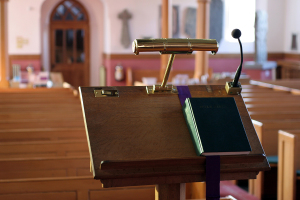Pete Wilson on What Every Believer Should Know in 'The Dips'
When in the Bible did God ever give anyone an easy job?
Pete Wilson, founding pastor of Cross Point Church in Nashville, Tenn., challenged the largely pastor audience at the Radicalis Conference on Thursday with this question.
"We're talking about radical trust," Wilson said. "God comes to Noah, and says, 'Noah, I have a job for you. I'm going to start all of civilization over with you and your family. Get on the boat, survive this flood' … And Noah says, 'I don't really understand this but I'll follow You.'"
"We read that Nehemiah rebuilt a city, David took on Goliath, and Esther risked her life to change the mind of the king. Joseph goes to prison, Daniel gets thrown in the lion's den, and He gives the ultimate assignment to Jesus Christ."
Demonstrating the need for radical trust, Wilson highlighted how God has used and continues to use men and women in significant ways. "But every single time, He calls them to live and to lead through adversity and through threat and through crisis."
But why did God use such radical ways to fulfill His tasks?
"If you look at every one of these different characters, what you'll find is that God is a lot more concerned with who they are becoming rather than where they are going or even what they are accomplishing."
Speaking to all the leaders, Wilson noted that the sooner they understood that and embraced that – that God cared about what was going on in the inside – it would bring meaning and purpose to many of the things that people were unable to understand.
Think about this question, Wilson encouraged. "What would God do in your life if you were able to trust Him with absolutely everything?"
During a difficult and dark stage in his ministry years ago, Wilson shared how he and his church were at the brink of collapsing. A series of events had led him to believe that everything was going to come crashing down.
After coming home from an elder's meeting one night, he pulled up to his garage and began weeping uncontrollably; he was embarrassed, ashamed, and completely broken.
Thinking everything was finished he woke up the next morning and met with a man who drew a very discouraging picture for him.
On a piece of paper, he drew a dot about midway up the paper. Pointing to that dot, he told Wilson,
"This is where you're at right now." Drawing another dot towards the upper corner of the paper, he said, "This is where you want to be."
You'd think that the path from here to there is just going to be a straight path, he explained to Wilson. But the truth is that it's going to dip down before it reaches that other point.
"What he drew that day," Wilson described, "I've had a hard time defining. But over the years I've kind of defined that as what I call the dip. And the dip is the spot in life or a spot in your ministry where you have a heightened sense of vulnerability and a diminished sense of power."
Knowing that most leaders wanted the exact opposite, a heightened sense of safety, and not a heightened sense of vulnerability, he relayed the message of 2 Corinthians 12: "My grace is sufficient for you, for my power is made perfect in your weakness."
Sometimes, God wanted people down in the dip.
"Our journey has to lead us through the dip because if not, we become the product of our own will and our own wisdom. And the day that you become the product of your own will and your own wisdom in the context of your church leadership, will be the day when everything begins to unravel."
"If you allow anything other than Christ to define you, it will grind you down."
Portraying the greatest example of this "dip," Wilson, author of Plan B, read from Matthew 26, where Jesus was seen to be at a heightened sense of vulnerability and diminished sense of power, just before he was taken to the cross to be crucified.
"My soul is overwhelmed with sorrow to the point of death … if it is possible, may this cup be taken from me, yet not as I will but as You will," Jesus cried.
"He ends up three times in that passage going back and saying God, if there is any other way, if there's any other way than this, if there's any other way than this certain death, than this certain cross … but if this is Your will let it be done."
It was radical trust in the face of complete vulnerability and powerlessness – this was the picture of Jesus.
From his own experiences while in that dip, Wilson warned of unique temptations that might arise where Satan attempts to derail leaders. Satan never struck with a stick, but with an idea, as shown with Eve and the serpent.
And the idea was this: God could not be trusted, so act to secure your own well-being.
Hoping to help remove this misconception, the Nashville pastor revealed three temptations, which he hoped believers would be aware of when in those inevitable dips.
The first temptation: thinking you're actually in control.
"Remember that there is a God, and it's not me," he reminded pastors.
"Martin Luther said it's the nature of God to make something out of nothing. This is the importance of trust and surrender. When you become nothing, God will yet still make something out of you."
The second temptation: ditching one's God-given values in the pursuit of God-given dreams.
"Your dream, no matter how big it might be, no matter how great it might be, will make a lousy God," Wilson said. "The reality of my life is that so much of my prayer and so much of my worship isn't really because I want more of God, but because I want him to give me my dreams and my visions, and I want all that to be done."
"And what I'm realizing in my life and my ministry is that my greatest temptation is not to chase after the ridiculously evil, my greatest temptation is to chase after what is deceptively good … Sometimes I sacrifice a whole more to make sure my ministry is working better than I do to sacrifice to know God more."
The last temptation Wilson spoke about was to feel abandoned.
"John 16:33 says in this world, you will have trouble. That's the seven-day forecast for your life: trouble, trouble, trouble."
"But then he follows that up and says 'take heart, for I have overcome the world.' There's something that happens in our lives and in our minds when [we] get into this place with a heightened sense of vulnerability and diminished sense of power, when life and ministry are not turning out the way [we] think it should, when [we] start to make this assumption – that God has abandoned me."
Wilson encouraged pastors to remember that "God is most powerfully present even when He seems to be most apparently absent."
"Never doubt in the dark what God has told you in the light," he said.
Differentiating between faith in God's activity versus faith in his identity, Wilson stressed the importance of putting one's faith in the latter. Only then, amid difficulty, would people know and trust that God has not forsaken His people.
"I've heard my whole life that the cross is offensive … what I'm learning is that it's not so much the cross that's offensive, as it is people who claim to follow the cross but look nothing like the man who hung on the cross."
"If you get nothing else out of this time, my prayer for you is that you will remember in the dip, it will be filled with opportunity after opportunity to be drawn into [God's] presence where He will shape you with His grace," he concluded.
The 2011 Radicalis Conference took place at Saddleback Church in Lake Forest, Calif., Feb. 22-25. It concluded Friday with Pastors Dave Gibbons and Rick Warren presenting the last sessions on radical living.





























